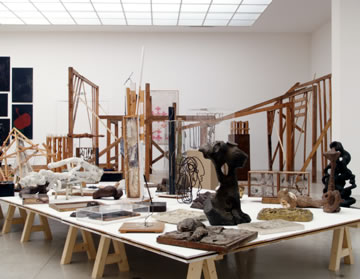Oswald Oberhuber
dal 25/1/2006 al 18/2/2006
Segnalato da
25/1/2006
Oswald Oberhuber
Wiener Secession, Wien
Der ewige Prozess der Geburt

Der ewige Prozess der Geburt
Curated by Oswald Oberhuber and Robert Fleck
Hauptraum, Grafisches Kabinett
To mark his 75th birthday, the Secession has invited its honorary member Oswald Oberhuber for an exhibition: it presents the essence of his wide-ranging contribution to the art and culture of this country-not only as an artist, but also as the curator of more than 150 exhibitions. This is also why he was in charge of designing the retrospective at the Secession; Robert Fleck, director of the Deichtorhallen in Hamburg, assisted in the role of a discussion partner. In the Hauptraum, influential but little-known works are being shown again for the first time in many years. In the Grafisches Kabinett, sections of Austria's recent art history are visible through the posters for exhibitions devised by Oberhuber.
Oswald Oberhuber has a reputation as one of the most scintillating personalities in the Austrian art world. At the same time, many artists and art-lovers, especially those of the younger generation, have barely experienced his work first-hand. This is particularly true of fields in which Oberhuber developed his sense of space. His large sculptures and room-filling installations and his large-scale paintings were often produced for a specific occasion, as for the 1972 Venice Biennial, or for situations in the public domain-and have not been seen since. The generous proportions and openness of the Secession's main space offer the opportunity to become acquainted with Oswald Oberhuber's oeuvre from the perspective of these important but unknown works. To a large extent, Oberhuber's creativity materializes itself in the guise of the Nebenprodukt (by-product), the name he used for an exhibition organized in 1970. Behind this lies an anti-heroic approach directed against the cult-like treatment of the art object, an approach which helps explain central stations in his development.
Oberhuber has made Austrian art history in several ways: through his informal sculpture of his early years, but also with the conceptual art exhibitions that he realized in Vienna and Innsbruck from 1969. The exhibition at the Secession deliberately shows these Austrian contributions to early Conceptual Art to a broader audience. One sometimes hears Oswald Oberhuber referred to as primarily a cultural politician. For an artists of this kind, however, the one is inconceivable without the other. In all parts of the exhibition-not only in the largely unknown posters and the references to the more than 150 exhibitions organized by Oberhuber-one finds statements on cultural policy that have lost none of their relevance. For him, every new series of works, every new exhibition is an appeal to his contemporaries not to adhere to aesthetic stereotypes.
The exhibition includes around 200 works from the years 1945 through 2005, including loans from MUMOK, Vienna, Neue Galerie am Landesmuseum Joanneum, Graz, Tiroler Landesmuseum, Innsbruck, the Schmutz Collection, Vienna, Galerie Christine Konig, Vienna, Galerie Meier, Innsbruck, Galerie Menotti, Baden bei Wien, and from the artist.
A folder with a text by Robert Fleck will be published to accompany the exhibition. Springer Verlag will also publish a book, edited by Stephan Ettl, entitled Oswald Oberhuber - KunstErfindung.
OSWALD OBERHUBER, born in 1931 in Meran, lives and works in Vienna.
1961-1972: member of the Tirol Art Senate; 1972: represented Austria at the Venice Biennial (with Hans Hollein); 1973: professor at the Academy of Applied Arts, Vienna (art education, printing, later life drawing); 1973-1978: artistic director at Galerie nachst St. Stephan; 1977: participation in documenta 6, Kassel; 1979-1987 and 1991-1995: rector of Academy of Applied Arts, Vienna; numerous solo exhibitions, including MUMOK, Vienna, MAK, Vienna, Neue Galerie am Landesmuseum Joanneum, Graz, Museum van Hedendaagse Kunst, Ghent. Honorary member of the Secession since 1999.
DR. PHIL. ROBERT FLECK, art critic and curator, born in 1957 in Vienna.
1978-1982: work at Galerie nachst St. Stephan, Vienna, and other galleries. Lived in France from 1982-2003. 1991-93: Federal Art Curator (with Dr. Cathrin Pichler). 1998: curated Das Jahrhundert der kunstlerischen Freiheit - 100 Jahre Secession and Manifesta 2 (with Maria Lind and Barbara Vanderlinden). 1998-2000: director of the postgraduate program at the Academy of Art in Nantes, which he then directed from 2000-2003. Since 2004: director of Deichtorhallen, Hamburg (Haus der Fotografie und Aktuelle Kunst). Has published 35 books, most recently: Die Muhl-Kommune, Cologne (Verlag Walther Konig) 2003 and Peter Fischli / David Weiss, London (Phaidon Monographs) 2005.
For further information and photographic material please contact: Urte Schmitt-Ulms
Wiener Secession, Association of Visual Artists
Friedrichstrasse 12, A-1010 Wien



